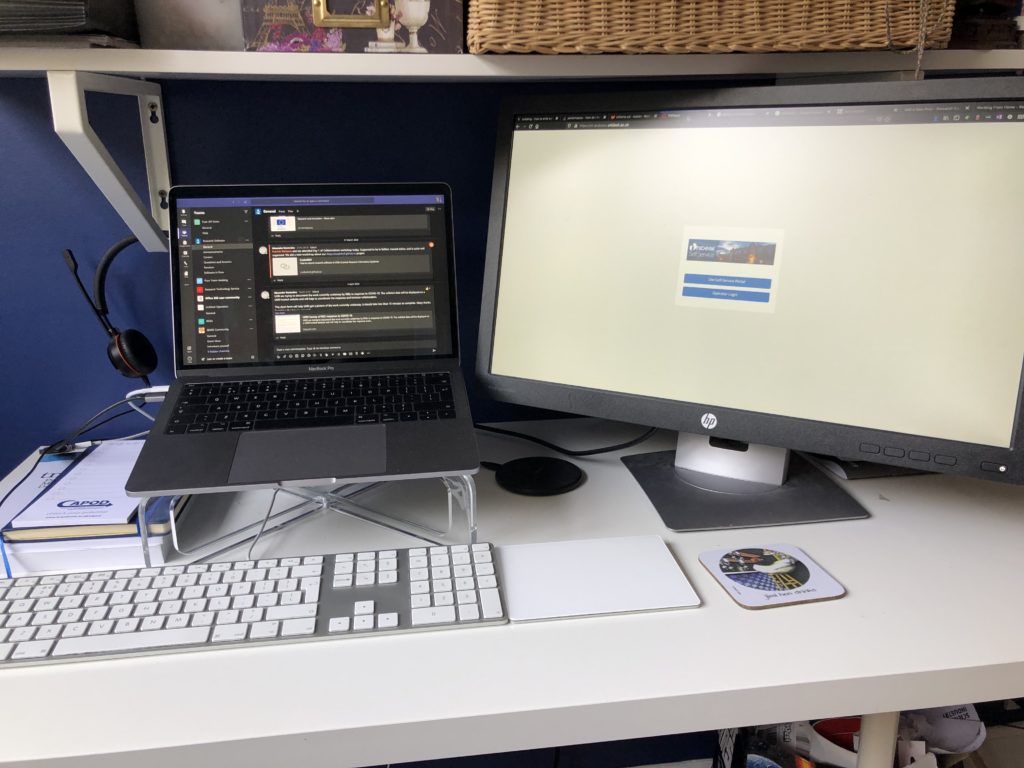Working From Home

We’re all working from home at the moment. Obviously, the regular routine is disrupted and there are more, or at least different, distractions to deal with, especially if you’ve got primary school-age children like I have. However, the Research Computing team has been able to get on with work OK, and I thought I’d take a moment to highlight some of the key tools that make this possible and remind everyone conducting research at St Andrews that we are here to provide support, including if you need help adjusting your development practices to working from home.
Of course.
Microsoft Teams
We’d been using Teams for quite a while beforehand, but the lockdown has made it central to the functioning of the team. The Research Computing Team is part of a larger team of developers in IT Services, and our daily video catch-ups have become crucial for providing structure to the day, keeping everyone informed and maintaining a sense of connection. Additionally, posts allow the sharing of everything from project details to sourdough starter tips.
Instant messaging within Teams is really useful for smaller conversations.
There are a number of Teams open to everyone to join. A useful one is the Office 365 user community, where you can find support relating to Teams and the rest of the Office 365 suite.
Another public Team is the Research Software Team, a place for people who develop software for research at St Andrews to connect with each other and get assistance. I keep an eye on it, and will endeavour to help where possible.
Skype For Business
Actually, I hardly touch this, but it’s always open in the background, because calls to my extension at work get routed through Skype For Business. This was set up quite recently, I think to increase flexibility ahead of our move to Walter Bower House, but has come into its own in the current circumstances.
VPN
The University’s VPN is what makes it possible for us to connect to all the University-hosted systems not otherwise accessible from the outside world. As well as various servers, this includes the Unviersity’s GitLab instance.
Git/GitHub/GitLab
Something else we were already using but which comes into its own when a team is scattered is distributed version control. We use Git with either GitHub or the University’s GitLab (VPN required), depending on the details of the project. See IT Services’ page on File Storage for details on how to get access to GitLab. If you sign up for GitHub, you get a handful of private repositories for free, but academic users can apply for more. Other version control hosting platforms are available. All typically include features like issue tracking and wikis for documentation alongside straightforward version control.
If you’re writing code and you’re not using version control, you should be, especially now. Even if you’re writing something other than code, you should consider it. Our Software Carpentry workshops always include a half-day on Git. We’re currently considering if and how it may be possible to run a workshop online. If you need any assistance with Git, please get in touch.
Support
Research Computing and IT Services generally are here to help. If you have an issue related to software development, please email [email protected]. If you have a quick question, or want to reach out to the wider community of research software developers at St Andrews, consider dropping by the Research Software Team. I’m also happy to answer quick queries via Chat in Microsoft Teams.